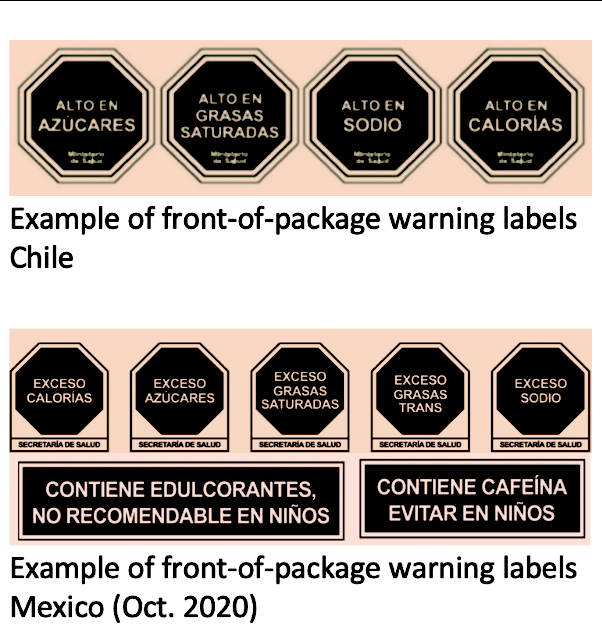New Guide Offers Road Map for Countries to Adopt Front-of-Package Labels

NEW YORK (Sept. 17, 2020) – Recent research revealed that people with obesity have 48% higher rates of death from COVID-19, and with more than 2 billion people overweight or obese globally, the push to combat obesity and improve nutrition has become more urgent than ever.
Evidence has shown that a key intervention is empowering consumers with clear front-of-package labels that identify the unhealthiest foods. Global health organization Vital Strategies and global partners today released the Guide to Introducing Effective Front-of-Package Nutrient Labels to assist countries in taking up this cost-effective, high-impact strategy to combat obesity.
“Smart labeling regulations work. Most shoppers spend fewer then 10 seconds selecting each food and beverage item—they need quick and easy ways to select the healthiest foods,” said Nandita Murukutla, Vice President of Global Policy and Research at Vital Strategies. “Our new guidebook will help countries develop smart strategies to use front-of-package space for visible and clearly understood nutrient warning labels that help consumers avoid unhealthy purchases and, ultimately, lead to healthier populations.”
The guidebook was produced by Vital Strategies and the University of North Carolina’s Global Food Research Program with support from Bloomberg Philanthropies, and presented at a virtual event alongside the United Nations General Assembly. The guidebook draws on success stories from countries such as Chile and Mexico and outlines how to develop effective front-of-package labels, including sharing the scientific basis for labels, how to adapt existing labels from other settings for local context, testing label designs, and the need to build public support for the effort.
“The best available evidence suggests that providing clear and informative front-of-package nutrient warning labels is one of the most effective approaches to preventing obesity and nutrition-related NCDs like diabetes and hypertension,” said Barry Popkin, Ph.D., and the W. R. Kenan Jr. Distinguished Professor of Nutrition at the University of North Carolina Gillings School of Global Public Health. “If people understand upfront, right in the grocery aisle, how certain foods impact health, they will be much more likely to make healthier choices.”
A study published by Prof. Popkin and colleagues in February 2019 provides some of the best evidence for front-of-package labels. It found that Chile’s adoption of front-of-package labels on sugar-sweetened beverages reduced consumption by nearly 25% in 18 months. When warning label regulations began, Chile was the number one consumer per capita of sugar-sweetened beverages in the world.
Nearly one-third of the world’s population are overweight or obese, including more than 41 million overweight children under the age of 5. Obesity is a key driver of noncommunicable disease, which causes more than 70% of global deaths. Unhealthy diets are estimated to be responsible for 11 million preventable deaths globally each year. Food insecurity and structural inequalities prevent many low- and middle-income communities from accessing fresh groceries and nutritious meals, leading to negative health consequences. The COVID-19 pandemic has exacerbated barriers to accessing affordable healthy foods, forcing many to rely on processed and low-nutrient foods.
“The obesity epidemic places an unsustainable burden on health systems, especially in low- and middle-income countries—and COVID-19 has brought new urgency to the issue,” said Dr. Neena Prasad, Director, Food Policy Program at Bloomberg Philanthropies. “It’s imperative that we continue to promote policies and strategies that reduce consumer demand for unhealthy foods and make healthier choices easier for everyone.”
“The ability for shoppers to quickly and easily discern which food and drink choices are healthier is an important piece of fighting negative health outcomes on a big scale,’ said Tlaleng Mofokeng, U.N. Special Rapporteur on the Right to Health. “I urge governments to act on the body of evidence compiled in this guide to give people the tools they need to make healthier choices for themselves and their families.”
Thirty-six countries currently require voluntary or mandatory interpretive labels on packaged food.
For more information or to download a copy of the Guide to Introducing Effective Front-of-Package Nutrient Labels, please visit: http://www.vitalstrategies.org/whats-in-our-food
###
Media Contact:
Christina Honeysett, Vital Strategies: choneysett@vitalstrategies.org; +1.914.424.3356
UNC Gillings School of Global Public Health; sphcomm@unc.edu
About Vital Strategies
Vital Strategies is a global health organization that believes every person should be protected by a strong public health system. We work with governments and civil society in 73 countries to design and implement evidence-based strategies that tackle their most pressing public health problems. Our goal is to see governments adopt promising interventions at scale as rapidly as possible. To find out more, please visit vstrategystage.wpengine.com or Twitter @VitalStrat.
Stay in the know: Follow #KnowCOVID or subscribe to Vital Strategies’ Twitter, Facebook or Instagram accounts.
About the UNC Gillings School of Global Public Health
The Gillings School of Global Public Health, part of the University of North Carolina at Chapel Hill, is the No. 1-ranked public school of public health in the United States. The School’s mission is to improve public health, promote individual well-being and eliminate health inequities across North Carolina and around the world. Faculty and staff anticipate public health threats and accelerate innovative solutions—always keeping students at the center of the work.
To learn more, visit: https://sph.unc.edu/resource-pages/about-the-school/